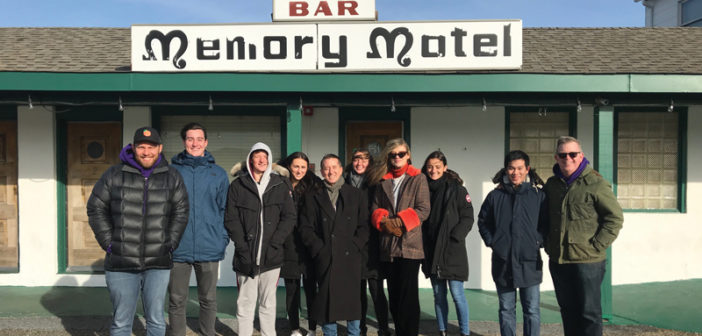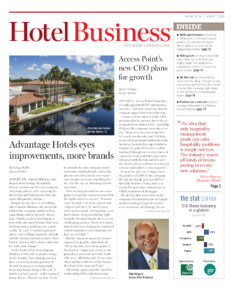NEW YORK—Training a new generation of workers, specifically hospitality workers, doesn’t just take an education anymore; it takes a hands-on and interactive approach.
Fostering a lifetime of professional passion and success, New York University’s School of Professional Studies has rolled out a program called “Real World,” teaching students problem-solving skills and helping them to navigate through the ever-evolving industry.
Throughout the program, students are tasked with “real” company challenges and encouraged to work alongside classmates, building on both teamwork and leadership skills. The program is offered to all students, with both graduate and undergraduate courses available.
The program offers these challenges from companies like Instagram, Porsche, Nike, JetBlue and CNBC among others, and Montauk, NY’s Memory Motel is bringing hospitality to the minds of NYU students.
At the beginning of the semester, students were presented with the challenge of vacant motel rooms at the property. Although used for employee housing, Memory Motel’s owner, Brian Kenny, felt that the property was missing out on a potential cash generator. Students were broken into different teams and set out to find possible solutions.
“Students needed to learn fundamentals—critical thinking, industry principles and context, and communication skills—but then they needed to actually do it; the stakes need to become real,” Kenny said. “It works particularity well in the hospitality space because it’s a space that is at the confluence of so many aspects of commerce and sociology, and it’s changing so rapidly. The idea that only hospitality management grads can solve hospitality problems is simply not true. The industry wants all kinds of brains joining to create new solutions.”
The idea is to draw solutions from the minds of students from all backgrounds and studies reflective of professional work environments, and could even elicit some excitement into the world of hospitality. However, much like the industry itself, the new generation of workers is changing. Similar to how hotel guests seek experiences over commodities, students are seeking interaction.
“This is a generation, with social media especially, that is participating publicly in the world from a very young age. They want real experience and when they get it, like in these classes, they are turned on in a way no textbook, whiteboard or case study could ever do,” Kenny said.
According to Kenny, David Hollander, assistant dean of NYU Real World, who created the program, knew that whether students are in any of the 16 professional degree programs the university offers—Hospitality and Tourism, Sports Management, Real Estate Management, Integrated Marketing, Human Resources Management, etc.—that real skills are needed for success. Bringing minds from these different areas offers hoteliers new solutions to some of the most pervasive problems.
“Hotels get fresh thinking from students—Gen Z, millennials—who are not ‘in the box’ of the hotel management’s day-to-day,” Hollander said. “Most valuable to the hotels is that because NYU Real World courses are composed of students from all kinds of different degree programs, they’re cross-disciplinary, so hotels get non-hotel/hospitality degree types solving new kinds of hotel problems. That’s what they want. They want brains from different intellectual orientations, not just students who have been thinking about nothing but one industry. They want those students too, but not only them. I choose brands I know students admire, brands they see as leaders already.”
Students work both collaboratively with their teams and competitively against other teams throughout the semester. At the end of the course, students create pitches to present to a panel from the company they are providing the solution for, with the winning teams getting to possibly turn their projects into real opportunities.
“They [hotels]see it as a talent pipeline. Over 14 weeks, they get to see a student’s real brain, their high-level strategic thinking; it’s the best interview process an organization could want. These courses have led to jobs, interviews and internships because of that,” Hollander said.
For NYU students, these courses have been of particular importance, Kenny explained, as city students are simultaneously part of the real-world hustle and college life. “NYU students are simply operating on a higher level of awareness and basic reality,” he said.
However, programs like these could be part of university offerings across the country, as more and more hotels hop on board—Atelier Ace previously ran a course at NYU with other popular hotels on tap for coming semesters.
The industry may need more of this type of collaboration between young workers and hotels in the future, given the labor and employment climate and evolving technology,
“We know that students change not just jobs but careers at least four to five times in their life; that’s happening right now,” Kenny said. “With rapid advances in biotech and AI, not just jobs but entire industries may become obsolete. Graduates will be navigating entirely new sets of facts and issues again and again for the rest of their lives. The skills they need are not narrowly learning how specific industries or professions operate, but instead, they should learn how to learn; that will set them up for a life of success. The way to learn that skill is to practice solving real problems with other human beings.”
For Memory Motel’s problem, for example, one group recommended setting up karaoke bars in the vacant rooms, and another group thought to turn it into a concession for late-night bites. No matter the solution, the groups’ collaborative work not only got the creative juices flowing but helped them problem solve on a financial level, coming up with prices for work, demolition, employees and sponsorship contacts, among other aspects of consideration.
“There can be no greater education than the experiential learning of working with others, in competition against other groups, on a real-time challenge to which there is no answer key,” Kenny said. “This creates the kinds of minds that the hospitality industry wants to hire, and it demystifies the professional experience. ‘Oh, so this is how people talk in a meeting?’ or ‘Oh, you have to think of every detail?’ This kind of learning makes graduates of these courses ready on day one where others simply are not.” HB


